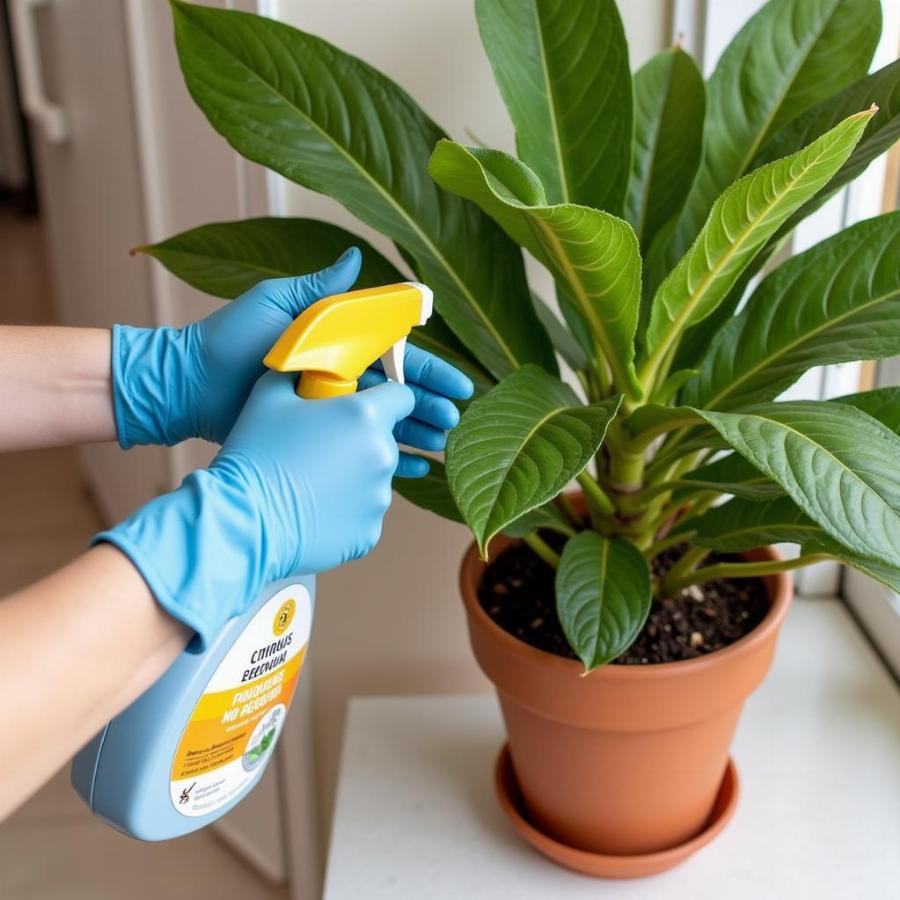Dogs rely heavily on their sense of smell, which is significantly more powerful than ours. This reliance on scent makes it possible to utilize certain smells that deter dogs, creating boundaries and protecting areas you’d prefer them to avoid. Understanding which smells dogs dislike can be a valuable tool for training, managing behavior, and protecting your garden or furniture.
Understanding Why Certain Smells Deter Dogs
Dogs’ olfactory systems are highly sensitive, making them susceptible to strong or pungent odors. While we might find a smell mildly unpleasant, the same scent can be overwhelming and even painful for a dog. This sensitivity is why certain smells act as natural deterrents.
Common Household Smells That Deter Dogs
Many common household items emit scents dogs find repulsive. These can be used strategically to discourage unwanted behaviors.
- Citrus fruits: The sharp, acidic smell of lemons, limes, oranges, and grapefruits is often too intense for dogs. You can use citrus peels in areas you want to protect, such as flower beds or furniture. Remember to replace the peels regularly as the scent fades.
- Vinegar: The pungent aroma of vinegar is another effective deterrent. Diluted white vinegar can be sprayed on baseboards, furniture legs, or outdoor areas to keep dogs away. Be mindful of delicate fabrics and always test in an inconspicuous area first.
- Ammonia: The strong smell of ammonia is highly offensive to dogs. However, it’s crucial to use this with extreme caution. Ammonia can be toxic, and even diluted solutions can cause respiratory irritation. It’s generally best to avoid using ammonia as a dog deterrent.
- Chili peppers: The capsaicin in chili peppers creates a burning sensation that dogs find unpleasant. Cayenne pepper can be sprinkled around garden edges to deter digging, but be careful not to let your dog ingest it.
Using Scents Safely and Effectively
 Sử dụng chất xịt mùi cho chó
Sử dụng chất xịt mùi cho chó
While these smells can be helpful, it’s important to use them responsibly. Never apply any substance directly to your dog. Always dilute strong solutions like vinegar, and avoid using anything that could be toxic if ingested. Monitor your dog’s reaction to ensure the scent isn’t causing distress.
Commercial Dog Repellents
Numerous commercial dog repellents utilize smells that deter dogs. These products are often formulated with essential oils like citronella, eucalyptus, and peppermint. how can i keep dogs off my lawn offers some helpful tips on choosing and using these products effectively. Remember to always follow the manufacturer’s instructions and choose products specifically designed for dogs.
Training and Positive Reinforcement
While deterrents can be helpful tools, they are most effective when used in conjunction with training and positive reinforcement. Teach your dog appropriate behaviors and reward them for making good choices. keep dogs off flower beds can guide you on combining deterrents with training for optimal results.
Conclusion
Understanding which smells deter dogs can be a valuable tool for managing their behavior and protecting your property. By using these scents safely and responsibly, combined with consistent training, you can create a harmonious environment for both you and your canine companion. Remember to prioritize your dog’s safety and well-being when using any deterrent method.
FAQs
-
What are some safe and effective smells that deter dogs? Citrus fruits, vinegar, and certain essential oils like citronella and eucalyptus are generally safe and effective.
-
Can I use essential oils directly on my dog? No, never apply essential oils directly to your dog. They can be toxic if ingested or absorbed through the skin.
-
What if my dog doesn’t react to the deterrent smells? Every dog is different. You may need to experiment with different scents or concentrations to find what works best.
-
Are commercial dog repellents safe? Most commercial repellents are safe when used as directed. Always follow the manufacturer’s instructions.
-
Is it cruel to use smells that deter dogs? When used responsibly, deterrents are not cruel. They are a humane way to manage behavior and protect your property.
-
What should I do if my dog ingests a deterrent? Contact your veterinarian immediately.
-
Can I make my own dog repellent? Yes, you can make your own repellent using diluted vinegar or citrus peels.
Considering Other Pet-Related Concerns?
You might also be interested in learning more about protecting your dog from certain fruits like limes: are limes bad for dogs. Or, perhaps you’re looking for ways to protect your yard from neighborhood dogs: how to keep dogs away from your yard. Also check out waterproof blanket for dogs for keeping your furry friend dry and comfortable.
Beaut Dogs: Your Trusted Source for Canine Information
Beaut Dogs is your one-stop resource for all things canine. We provide expert advice and guidance on everything from choosing the right breed to providing the best possible care. When you need assistance, please contact us via Email at [email protected] for detailed and accurate answers. We’re here to help you navigate the wonderful world of dog ownership.